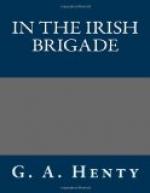At daybreak, the cruisers all returned. None had seen any signs of the French squadron, and Sir George Byng, leaving the majority of the fleet to maintain watch, sailed with his prize for Harwich. Here the prisoners were handed over to the military authorities; while the admiral started for London, in a post chaise, to carry the news of the failure of the French to effect a landing, and of their return to Dunkirk,—news that was received with exuberant delight by the supporters of Government, and the commercial portion of the population, who had been threatened by ruin. The run upon the banks had been unprecedented, and although the House of Commons had relaxed the regulations of the Bank of England, the panic was so great that it could not have kept its doors open another twelve hours.
The treatment of the prisoners was now very different from what it had been on board ship. Not only were they confined to prison, but, to their indignation, irons were placed on their legs, as if they had been common malefactors. The only mitigation allowed to them was that their servants were permitted to attend upon them. Their clothes had been rigorously searched, and their boots taken off, but no suspicions had been entertained that coin had been hidden in those of Desmond and his friends.
Two days later an order was received from Government, and the officers were marched up to town, ironed as they were, under a strong guard, and were imprisoned at Newgate. Callaghan and the other servants remained in prison at Harwich.
“Things are looking bad, Kennedy,” O’Neil said dolefully, for the three officers had, at their own request, been allotted a cell together.
“They don’t look very bright, but we must make allowance for the awful fright that, as we hear, has been caused by the expedition. Possibly, when they have got over the shock, things may be better.”
“I will never forgive them for putting irons on us,” O’Sullivan said passionately. “If they had shot us at once, it was, I suppose, what we had a right to expect; but to be treated like murderers, or ruffians of the worst kind, is too bad.”
“Well, we were rid of the irons as soon as we got here. No doubt these were only put on to prevent the possibility of any of us escaping. I am sure, by their looks, that some of our escort would willingly have aided us, only that it was impossible to do so; and, knowing how large a number of persons would sympathize with us, I cannot blame them so very much for taking steps to prevent our escape.”
“I never saw such a fellow as you for finding excuses for people,” O’Sullivan said, almost angrily. “You look at things as calmly as if they concerned other people, and not ourselves.”
Kennedy smiled.
“If an opinion is to be worth anything, O’Sullivan, it must be an impartial one; and it is best to look at the matter calmly, and to form our plans, whatever they may be, as if they were intended to be carried out by other people.”




